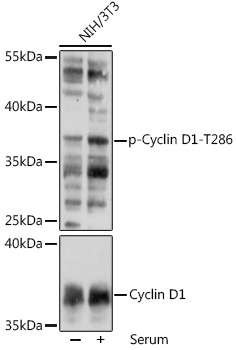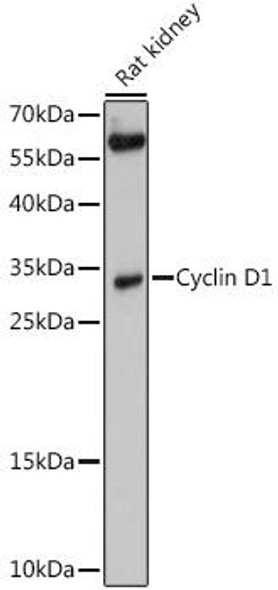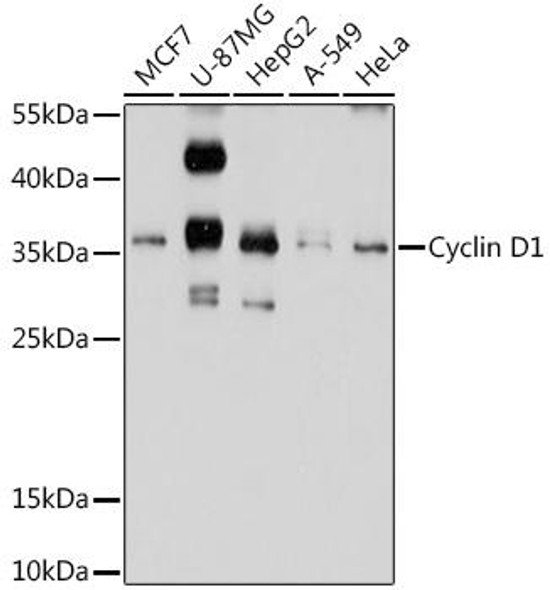Cell Cycle Antibodies 2
Anti-Phospho-Cyclin D1-T286 Antibody (CABP1061)
- SKU:
- CABP1061
- Product Type:
- Antibody
- Reactivity:
- Human
- Reactivity:
- Mouse
- Reactivity:
- Rat
- Host Species:
- Rabbit
- Isotype:
- IgG
- Antibody Type:
- Polyclonal Antibody
- Research Area:
- Cell Cycle
Description
| Antibody Name: | Anti-Phospho-Cyclin D1-T286 Antibody |
| Antibody SKU: | CABP1061 |
| Antibody Size: | 20uL, 50uL, 100uL |
| Application: | WB IHC |
| Reactivity: | Human, Mouse, Rat |
| Host Species: | Rabbit |
| Immunogen: | A phospho synthetic peptide corresponding to residues surrounding T286 of human Cyclin D1. |
| Application: | WB IHC |
| Recommended Dilution: | WB 1:500 - 1:2000 IHC 1:50 - 1:200 |
| Reactivity: | Human, Mouse, Rat |
| Positive Samples: | NIH/3T3 |
| Immunogen: | A phospho synthetic peptide corresponding to residues surrounding T286 of human Cyclin D1. |
| Purification Method: | Affinity purification |
| Storage Buffer: | Store at -20°C. Avoid freeze / thaw cycles. Buffer: PBS with 0.02% sodium azide, 50% glycerol, pH7.3. |
| Isotype: | IgG |
| Sequence: | Email for sequence |
| Gene ID: | 595 |
| Uniprot: | P24385 |
| Cellular Location: | Cytoplasm, Membrane, Nucleus |
| Calculated MW: | 33kDa |
| Observed MW: | 37kDa |
| Synonyms: | BCL1, D11S287E, PRAD1, U21B31, CCND1, Cyclin D1, cyclin D1 |
| Background: | The protein encoded by this gene belongs to the highly conserved cyclin family, whose members are characterized by a dramatic periodicity in protein abundance throughout the cell cycle. Cyclins function as regulators of CDK kinases. Different cyclins exhibit distinct expression and degradation patterns which contribute to the temporal coordination of each mitotic event. This cyclin forms a complex with and functions as a regulatory subunit of CDK4 or CDK6, whose activity is required for cell cycle G1/S transition. This protein has been shown to interact with tumor suppressor protein Rb and the expression of this gene is regulated positively by Rb. Mutations, amplification and overexpression of this gene, which alters cell cycle progression, are observed frequently in a variety of tumors and may contribute to tumorigenesis. |
| UniProt Protein Function: | CCND1: a member of the highly conserved cyclin family, whose members are characterized by a dramatic periodicity in protein abundance through the cell cycle. Cyclins function as regulators of CDK kinases. Forms a complex with and functions as a regulatory subunit of CDK4 or CDK6, whose activity is required for cell cycle G1/S transition. This protein has been shown to interact with tumor suppressor protein Rb and the expression of this gene is regulated positively by Rb. |
| UniProt Protein Details: | Protein type:Activator; Cell cycle regulation; Nuclear receptor co-regulator; Oncoprotein Chromosomal Location of Human Ortholog: 11q13.3 Cellular Component: cyclin-dependent protein kinase holoenzyme complex; cytosol; intracellular; nucleoplasm; nucleus; transcriptional repressor complex Molecular Function:enzyme binding; histone deacetylase binding; protein binding; protein kinase binding; transcription corepressor activity; transcription factor binding Biological Process: G1 DNA damage checkpoint; G1/S transition of mitotic cell cycle; negative regulation of transcription from RNA polymerase II promoter; positive regulation of cell cycle; positive regulation of cyclin-dependent protein kinase activity; positive regulation of protein amino acid phosphorylation; response to DNA damage stimulus; response to drug Disease: Myeloma, Multiple; Von Hippel-lindau Syndrome |
| NCBI Summary: | The protein encoded by this gene belongs to the highly conserved cyclin family, whose members are characterized by a dramatic periodicity in protein abundance throughout the cell cycle. Cyclins function as regulators of CDK kinases. Different cyclins exhibit distinct expression and degradation patterns which contribute to the temporal coordination of each mitotic event. This cyclin forms a complex with and functions as a regulatory subunit of CDK4 or CDK6, whose activity is required for cell cycle G1/S transition. This protein has been shown to interact with tumor suppressor protein Rb and the expression of this gene is regulated positively by Rb. Mutations, amplification and overexpression of this gene, which alters cell cycle progression, are observed frequently in a variety of tumors and may contribute to tumorigenesis. [provided by RefSeq, Jul 2008] |
| UniProt Code: | P24385 |
| NCBI GenInfo Identifier: | 116152 |
| NCBI Gene ID: | 595 |
| NCBI Accession: | P24385.1 |
| UniProt Secondary Accession: | P24385,Q6LEF0, |
| UniProt Related Accession: | P24385 |
| Molecular Weight: | 34kDa |
| NCBI Full Name: | G1/S-specific cyclin-D1 |
| NCBI Synonym Full Names: | cyclin D1 |
| NCBI Official Symbol: | CCND1 |
| NCBI Official Synonym Symbols: | BCL1; PRAD1; U21B31; D11S287E |
| NCBI Protein Information: | G1/S-specific cyclin-D1 |
| UniProt Protein Name: | G1/S-specific cyclin-D1 |
| UniProt Synonym Protein Names: | B-cell lymphoma 1 protein; BCL-1; BCL-1 oncogene; PRAD1 oncogene |
| Protein Family: | G1/S-specific cyclin |
| UniProt Gene Name: | CCND1 |







